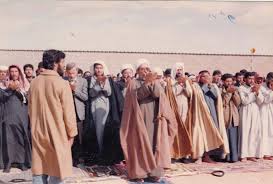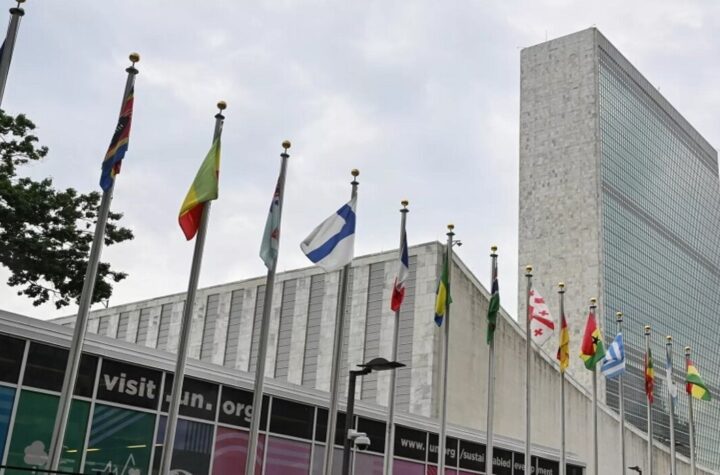
raqis in Saudi Arabia – the Forgotten Refugees
December 9, 1991
By Mamoun Fandy Mamoun Fandy writes on Middle East affairs from Carbondale, Ill.
AFTER the Gulf war, most of the news about refugees in the Western media has focused on the Kurds in Turkey and Iran. Little attention has been paid the 150,000 Iraqi refugees in Saudi Arabia. These refugees are the Iraqi civilians who revolted against Saddam Hussein in response to President Bush’s call earlier in the crisis. After the rebellion was crushed by Mr. Hussein’s forces, those who survived fled to Saudi Arabia, where they were placed in refugee camps.The situation of these refugees is deplorable. They are heavily guarded by Saudi military personnel and not allowed to go out of the camps or have any contact with the outside world. They are de facto prisoners, as letters smuggled out of these camps indicate. Although an obscure issue, the political consequences of the problem of Iraqi refugees in Saudi Arabia could prove fatal to United States foreign policy regarding the future of Iraq. The Iraqi refugees live in six camps scattered throughout the northeast of the Saudi kingdom. The Saudi government, however, allows no human-rights organizations or foreign reporters to see these camps. The only exception was the limited access given to some reporters to the Rafha camp earlier in the crisis. Refugees writing to relatives in the US and other countries have asked that other camps, namely that in Artawia, be visited by human rights organizations or a United Nations special committee. Mohammed al-Hazji, one of those refugees, wrote on Oct. 10 to Khalid Kashtini, a columnist for the London-based Saudi newspaper al-Sharq al-Awsat, “After fighting a tyrant and sacrificing our future and that of our families back home, my colleagues and I are still here in the Saudi camps. We have no idea what the future holds for us; we are losing weight from one day to the next. We ask you to pay attention to us as you did to our brothers in the north [meaning the Kurds].” The refugees, however, have been ignored by the American press. Except for an Oct. 1 report on the Arabic broadcast of the Voice of America (VOA) about a small demonstration in front of the Saudi embassy in Washington, the Western media have mentioned nothing about the conditions or the plight of these refugees. Consequently, the only people who know of the situation of the Iraqi refugees in Saudi Arabia are fellow Arabs. For them, this is another example confirming what most people from the poorer Arab countries have been saying all along – namely, that the West is totally indifferent to the human rights of Arabs. THOSE who demonstrated in behalf of the Iraqi refugees demanded that the Saudi government set them free. They asked that the refugees either be allowed to work in Saudi Arabia or to go to other Arab countries such as Jordan or Syria where they would be given the same rights as citizens. Some of these refugees are highly educated – university professors, lawyers, doctors, and engineers. They are liberals who revolted against Saddam’s oppression. Yet, as one of the letters puts it, the repression in Iraq looks good in comparison to the their treatment in Saudi Arabia. One of their spokespersons, Dr. Abdul Hamid, in an interview with the Arabic VOA on Oct. 1, questions the Saudi claims that these refugees have been well-treated. If these people are well-treated, why are they imprisoned and not allowed to leave? The refugees want to leave because most of them left families back in Iraq, whose safety is of desperate concern. The refugees point out that the Saudis are using their flight to Saudi Arabia as part of a media campaign to demonize Saddam and the Baath party. They’re afraid this will bring retaliation against family members back home. The plight of Iraqi refugees in Saudi Arabia gives Saddam’s opposition another reason for cynicism. Although the Bush administration has continuously stated that it wants Saddam’s regime to go, it countenances the violent repression of Saddam’s opponents. Earlier in the crisis US statements deluded the Kurds and the Shiites into revolting and then Washington sat by while Saddam crushed these rebellions. Now, the third component of the Iraqi opposition, the Sunni Muslim liberals, are being imprisoned in Saudi Arabia, presumably with US consent. In the words of one of the opposition leaders, “The Americans like to keep us [the Iraqi opposition] in line with the Saudi view of regional stability.” If some of the steps taken by American policymakers during and after the crisis are reviewed, this observation appears valid. America is acting in response to Saudi anxiety rather than the needs of the Iraqi opposition. If the Bush administration wants to have any credibility with the Iraqi opposition, it has to pay attention to the plight of the Sunni refugees in Saudi Arabia. Such credibility is one of the few
العراقيون في السعودية – اللاجئون المنسيون
9 ديسمبر 1991
بقلم مأمون فندي مأمون فندي يكتب عن شؤون الشرق الأوسط من كاربونديل ، إيلينوي.
بعد حرب الخليج ، تركزت معظم الأخبار حول اللاجئين في وسائل الإعلام الغربية على الأكراد في تركيا وإيران. لم يتم إيلاء اهتمام يذكر لـ 150.000 لاجئ عراقي في المملكة العربية السعودية. هؤلاء اللاجئون هم المدنيون العراقيون الذين ثاروا على صدام حسين استجابة لدعوة الرئيس بوش في وقت سابق من الأزمة. بعد سحق التمرد من قبل السيد. هرب من نجوا من قوات صدام إلى السعودية ، حيث تم وضعهم في مخيمات للاجئين ، ووضع هؤلاء اللاجئين يرثى له. إنهم يخضعون لحراسة مشددة من قبل أفراد عسكريين سعوديين ولا يُسمح لهم بالخروج من المعسكرات أو الاتصال بالعالم الخارجي. إنهم سجناء بحكم الأمر الواقع ، كما تشير الرسائل المهربة من هذه المعسكرات. على الرغم من كونها قضية غامضة ، إلا أن العواقب السياسية لمشكلة اللاجئين العراقيين في المملكة العربية السعودية يمكن أن تكون قاتلة للسياسة الخارجية للولايات المتحدة فيما يتعلق بمستقبل العراق. يعيش اللاجئون العراقيون في ستة مخيمات منتشرة في شمال شرق المملكة العربية السعودية. لكن الحكومة السعودية لا تسمح لمنظمات حقوق الإنسان أو المراسلين الأجانب برؤية هذه المعسكرات. كان الاستثناء الوحيد هو محدودية الوصول لبعض المراسلين إلى مخيم رفحاء في وقت سابق من الأزمة. طلب اللاجئون الذين يكتبون إلى أقاربهم في الولايات المتحدة ودول أخرى أن تزور منظمات حقوق الإنسان أو لجنة خاصة تابعة للأمم المتحدة المخيمات الأخرى ، وبالتحديد تلك الموجودة في الأرطاوية. محمد الحزجي ، أحد هؤلاء اللاجئين ، كتب في أكتوبر / تشرين الأول. 10- لخالد كشتيني كاتب عمود في صحيفة الشرق الأوسط السعودية التي تتخذ من لندن مقراً لها ، “بعد قتال طاغية والتضحية بمستقبلنا ومستقبل عائلاتنا في الوطن ، ما زلت أنا وزملائي هنا في المخيمات السعودية. “ليس لدينا أي فكرة عما يخبئه لنا المستقبل ؛ نحن نفقد الوزن من يوم لآخر. نطلب منكم أن تنتبهوا إلينا كما فعلتم بإخواننا في الشمال [أي الأكراد]”. ومع ذلك ، تجاهلت الصحافة الأمريكية اللاجئين. باستثناء أكتوبر. 1 في تقرير بثته العربية إذاعة صوت أمريكا (VOA) عن مظاهرة صغيرة أمام السفارة السعودية في واشنطن ، لم تذكر وسائل الإعلام الغربية شيئًا عن أوضاع هؤلاء اللاجئين أو محنتهم. وبالتالي ، فإن الأشخاص الوحيدين الذين يعرفون وضع اللاجئين العراقيين في السعودية هم إخواننا العرب. بالنسبة لهم ، هذا مثال آخر يؤكد ما كان يقوله معظم الناس من الدول العربية الأفقر طوال الوقت – أي أن الغرب لا يبالي تمامًا بحقوق الإنسان للعرب. أولئك الذين تظاهروا نيابة عن اللاجئين العراقيين طالبوا الحكومة السعودية بإطلاق سراحهم. طلبوا السماح للاجئين إما بالعمل في المملكة العربية السعودية أو الذهاب إلى دول عربية أخرى مثل الأردن أو سوريا حيث سيتم منحهم نفس الحقوق التي يتمتع بها المواطنون. بعض هؤلاء اللاجئين على درجة عالية من التعليم – أساتذة جامعات ومحامون وأطباء ومهندسون. إنهم ليبراليون ثاروا على اضطهاد صدام. ومع ذلك ، وكما تقول إحدى الرسائل ، فإن القمع في العراق يبدو جيدًا مقارنة بمعاملتهم في السعودية. أحد المتحدثين باسمهم ، د. عبد الحميد في مقابلة مع إذاعة صوت أمريكا في أكتوبر 1 ، يشكك في ادعاءات السعودية بأن هؤلاء اللاجئين قد عوملوا معاملة حسنة. إذا كان هؤلاء يعاملون معاملة حسنة ، فلماذا يُسجنون ولا يُسمح لهم بالمغادرة؟ يرغب اللاجئون في المغادرة لأن معظمهم تركوا عائلاتهم في العراق ، التي تشكل سلامتها مصدر قلق بالغ. ويشير اللاجئون إلى أن السعوديين يستخدمون رحلتهم إلى السعودية كجزء من حملة إعلامية لتشويه صورة صدام وحزب البعث. إنهم يخشون أن يؤدي هذا إلى الانتقام من أفراد الأسرة في الوطن. محنة اللاجئين العراقيين في السعودية تعطي معارضة صدام سبباً آخر للسخرية. على الرغم من أن إدارة بوش صرحت باستمرار بأنها تريد أن يرحل نظام صدام ، إلا أنها تعارض القمع العنيف لخصوم صدام. في وقت سابق من الأزمة ، خدعت التصريحات الأمريكية الأكراد والشيعة إلى التمرد ، ثم جلست واشنطن فيما سحق صدام هذه الثورات. الآن ، المكون الثالث للمعارضة العراقية ، الليبراليون المسلمون السنة ، مسجونون في المملكة العربية السعودية ، على الأرجح بموافقة الولايات المتحدة. وبحسب ما قاله أحد قادة المعارضة ، فإن “الأمريكيين يحبون أن يبقينا [المعارضة العراقية] منسجمين مع النظرة السعودية للاستقرار الإقليمي”. إذا تمت مراجعة بعض الخطوات التي اتخذها صانعو السياسة الأمريكيون أثناء الأزمة وبعدها ، فإن هذه الملاحظة تبدو صحيحة. أمريكا تتصرف رداً على القلق السعودي وليس استجابة لحاجات المعارضة العراقية. إذا كانت إدارة بوش تريد أن يكون لها أي مصداقية مع المعارضة العراقية ، فعليها أن تنتبه إلى محنة اللاجئين السنة في المملكة العربية السعودية. هذه المصداقية هي واحدة من الأسلحة القليلة التي تمتلكها الولايات المتحدة ضد صدام ، بخلاف الأسلحة العسكري





نحن معكم على مدار الوقت
Iraq, Saudi Arabia: Riyadh Backs the Media Battleground
A NATION AT WAR: IRAQI EXILES; In Saudi Desert, ’91 Iraqi Refugees Long to Return
Colin Powell Secretary of State U.S. Department of State Washington, D.C. 20520